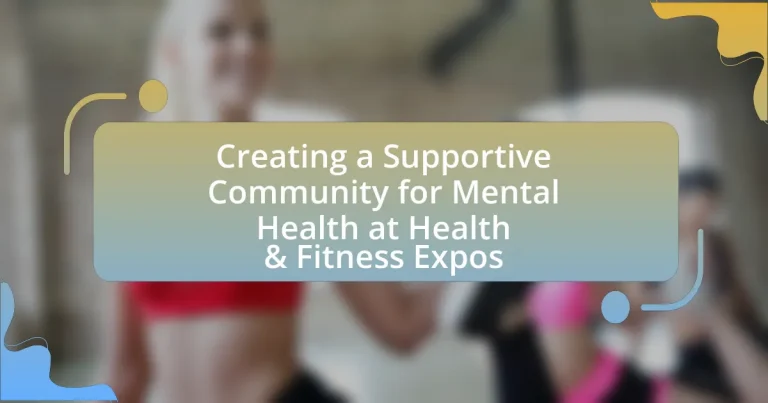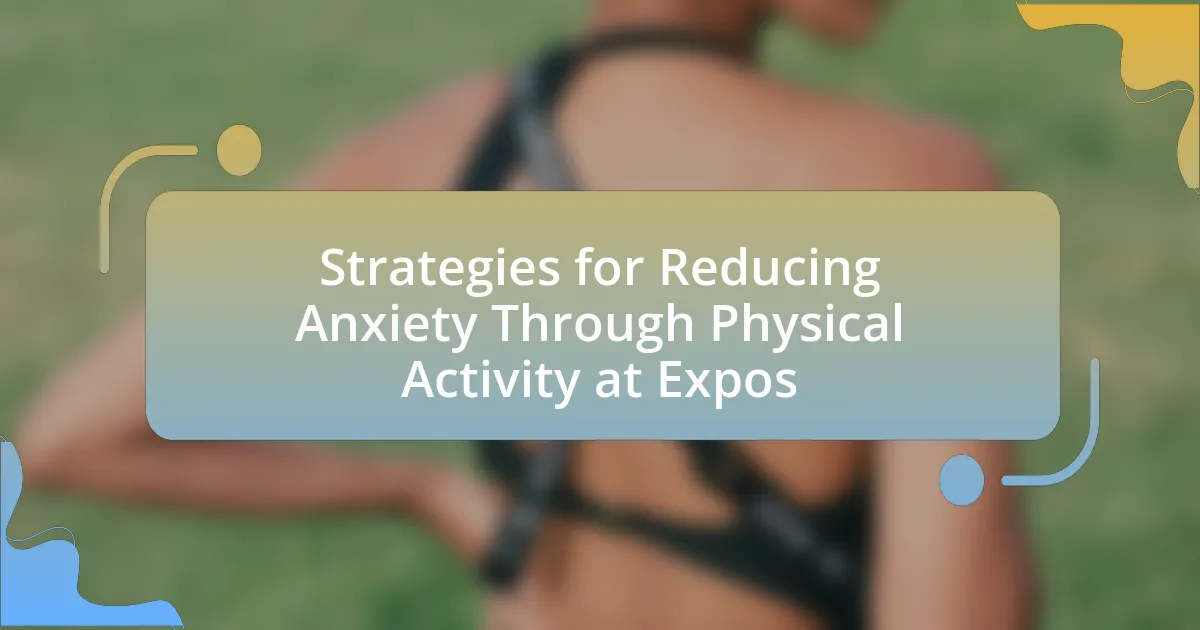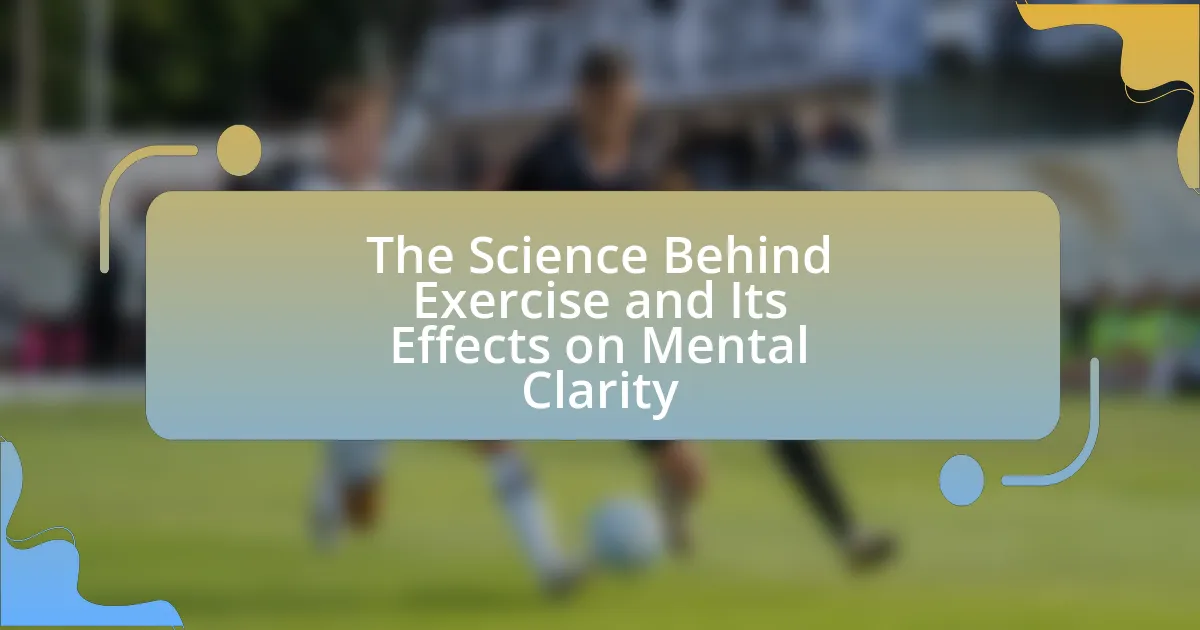Creating a supportive community for mental health at health and fitness expos involves fostering an environment where individuals can discuss mental health issues, share experiences, and access resources. The article outlines the importance of integrating mental health initiatives into these events, highlighting the impact of mental health on physical fitness and overall well-being. Key components of a supportive community include open communication, access to resources, and a culture of acceptance, while strategies for engagement involve workshops, expert panels, and partnerships with mental health organizations. The article also addresses challenges such as stigma and resource limitations, emphasizing the need for ongoing support and effective measurement of mental health programming success.
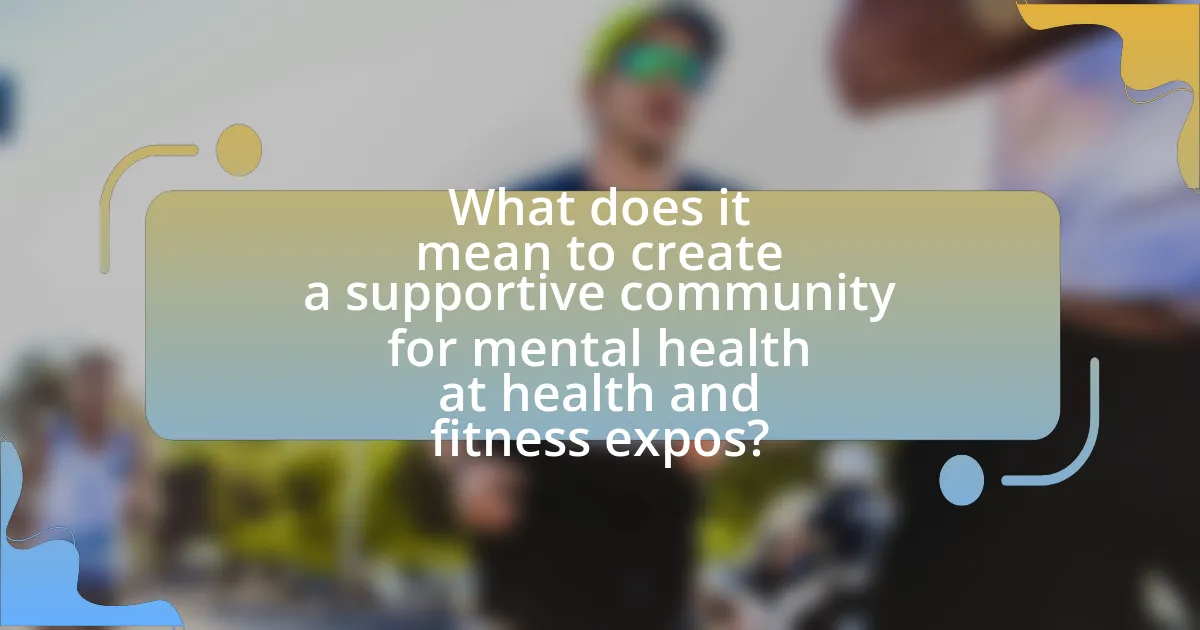
What does it mean to create a supportive community for mental health at health and fitness expos?
Creating a supportive community for mental health at health and fitness expos means fostering an environment where individuals can openly discuss mental health issues, share experiences, and access resources. This involves organizing workshops, panel discussions, and support groups that focus on mental well-being, thereby reducing stigma and promoting awareness. Research indicates that community support significantly enhances mental health outcomes; for instance, a study published in the Journal of Health Psychology found that social support can lead to lower levels of anxiety and depression. By integrating mental health initiatives into health and fitness expos, organizers can create a holistic approach to wellness that addresses both physical and mental health needs.
Why is mental health important in the context of health and fitness expos?
Mental health is important in the context of health and fitness expos because it directly influences overall well-being and the effectiveness of physical health initiatives. Research indicates that mental health conditions, such as anxiety and depression, can hinder individuals’ motivation to engage in physical activities and maintain healthy lifestyles. For instance, a study published in the Journal of Clinical Psychology found that individuals with better mental health are more likely to participate in regular exercise, which is crucial for both physical and mental well-being. Additionally, health and fitness expos provide a platform for promoting mental health awareness, fostering community support, and encouraging holistic approaches to health that integrate both mental and physical aspects.
How does mental health impact physical fitness and overall well-being?
Mental health significantly impacts physical fitness and overall well-being by influencing motivation, energy levels, and the ability to engage in physical activities. Individuals with positive mental health are more likely to participate in regular exercise, which enhances physical fitness and contributes to better health outcomes. Conversely, poor mental health can lead to decreased physical activity, increased fatigue, and a higher likelihood of chronic health issues. Research indicates that individuals experiencing anxiety or depression often report lower levels of physical activity, which correlates with poorer overall health. For example, a study published in the Journal of Clinical Psychiatry found that individuals with depression were 1.5 times more likely to be inactive compared to those without depression, highlighting the direct link between mental health and physical fitness.
What role do health and fitness expos play in promoting mental health awareness?
Health and fitness expos play a crucial role in promoting mental health awareness by providing a platform for education, resources, and community engagement. These events often feature workshops, seminars, and discussions led by mental health professionals, which help to destigmatize mental health issues and encourage open conversations. For instance, a study published in the Journal of Health Psychology found that community events significantly increase awareness and understanding of mental health topics among attendees. Additionally, health and fitness expos foster a sense of community, allowing individuals to connect with others who share similar experiences, thereby enhancing social support networks that are vital for mental well-being.
What are the key components of a supportive community for mental health?
The key components of a supportive community for mental health include open communication, access to resources, social connections, and a culture of acceptance. Open communication fosters an environment where individuals feel safe to share their experiences and seek help, which is essential for mental well-being. Access to resources, such as mental health services and educational materials, empowers community members to address their mental health needs effectively. Social connections provide emotional support and reduce feelings of isolation, which are critical for mental health. Lastly, a culture of acceptance encourages understanding and reduces stigma, allowing individuals to feel valued and supported within the community. These components collectively create an environment conducive to mental health and well-being.
How can inclusivity and diversity enhance community support?
Inclusivity and diversity enhance community support by fostering a sense of belonging and understanding among individuals from various backgrounds. When communities embrace diverse perspectives, they create an environment where everyone feels valued and heard, which is essential for mental health. Research indicates that inclusive communities can lead to improved mental well-being, as individuals are more likely to seek help and support when they feel accepted. For instance, a study published in the American Journal of Public Health found that communities with higher levels of social cohesion and inclusivity reported lower rates of mental health issues. This demonstrates that inclusivity and diversity not only strengthen community ties but also contribute to better mental health outcomes.
What resources are essential for fostering mental health support at expos?
Essential resources for fostering mental health support at expos include trained mental health professionals, informational materials, and designated safe spaces. Trained mental health professionals provide immediate support and guidance, ensuring attendees have access to expert help. Informational materials, such as brochures and pamphlets, educate participants about mental health issues and available resources, promoting awareness and understanding. Designated safe spaces offer a calming environment for individuals to decompress, facilitating open conversations about mental health. These resources collectively create a supportive atmosphere that encourages attendees to seek help and engage in discussions about mental well-being.
How can health and fitness expos effectively engage attendees in mental health initiatives?
Health and fitness expos can effectively engage attendees in mental health initiatives by incorporating interactive workshops, expert panels, and resource booths focused on mental well-being. These activities create an immersive environment where participants can learn about mental health, share experiences, and access support services. For instance, a study published in the Journal of Health Psychology found that interactive engagement significantly increases knowledge retention and encourages positive behavioral changes regarding mental health. By providing a platform for open discussions and practical strategies, health and fitness expos can foster a supportive community that prioritizes mental health alongside physical fitness.
What types of activities can promote mental health awareness at expos?
Activities that can promote mental health awareness at expos include workshops, panel discussions, interactive booths, and mindfulness sessions. Workshops can provide practical skills for managing mental health, while panel discussions featuring mental health professionals can offer insights and foster dialogue. Interactive booths can engage attendees with resources and information, and mindfulness sessions can teach stress-reduction techniques. Research indicates that such activities can significantly increase awareness and understanding of mental health issues, as evidenced by a study published in the Journal of Mental Health, which found that community engagement events led to a 30% increase in mental health literacy among participants.
How can partnerships with mental health organizations enhance expo offerings?
Partnerships with mental health organizations can enhance expo offerings by providing expert resources, workshops, and support services that promote mental well-being. These collaborations enable expos to feature specialized sessions led by mental health professionals, which can educate attendees on mental health issues and coping strategies. For instance, research from the National Alliance on Mental Illness indicates that community engagement through such partnerships can significantly reduce stigma and increase awareness about mental health, thereby fostering a more supportive environment at the expo. Additionally, mental health organizations can offer on-site counseling and resources, creating a holistic experience that addresses both physical and mental health needs.
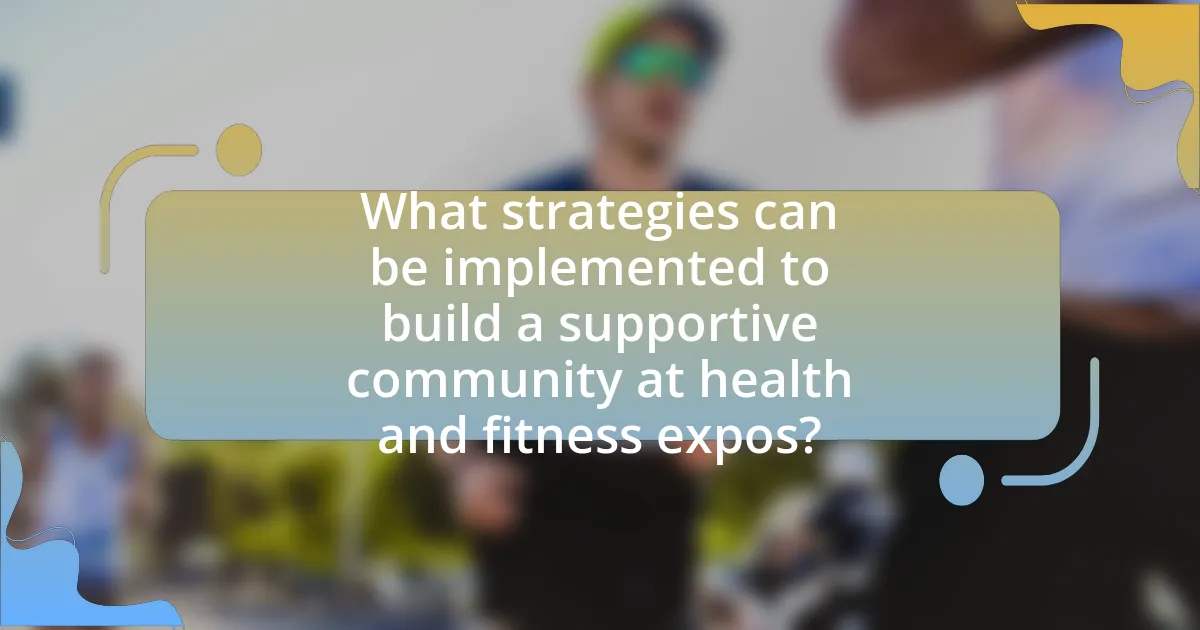
What strategies can be implemented to build a supportive community at health and fitness expos?
To build a supportive community at health and fitness expos, organizers can implement strategies such as creating interactive workshops, facilitating group activities, and providing mental health resources. Interactive workshops encourage participation and foster connections among attendees, while group activities, such as fitness challenges or team-building exercises, promote camaraderie and support. Additionally, offering mental health resources, including access to counselors or informational materials, ensures that attendees have the tools they need to prioritize their mental well-being. These strategies have been shown to enhance community engagement and support networks, as evidenced by studies indicating that social connections significantly improve mental health outcomes in fitness environments.
How can workshops and seminars contribute to mental health support?
Workshops and seminars can significantly contribute to mental health support by providing education, fostering community connections, and promoting coping strategies. These events offer participants valuable information on mental health topics, which can enhance understanding and reduce stigma. For instance, a study published in the Journal of Mental Health found that educational workshops increased participants’ knowledge about mental health issues by 40%, leading to improved attitudes towards seeking help. Additionally, workshops and seminars create a space for individuals to share experiences and build supportive networks, which is crucial for emotional well-being. Research indicates that social support is linked to lower levels of anxiety and depression, highlighting the importance of community engagement in mental health initiatives.
What topics should be covered in mental health workshops at expos?
Mental health workshops at expos should cover topics such as stress management, coping strategies for anxiety and depression, the importance of self-care, and building resilience. These subjects are essential as they provide attendees with practical tools and knowledge to improve their mental well-being. Research indicates that workshops focusing on stress management techniques can significantly reduce anxiety levels, as evidenced by a study published in the Journal of Clinical Psychology, which found that participants who engaged in stress management workshops reported a 30% decrease in anxiety symptoms. Additionally, discussions on self-care practices are crucial, as they empower individuals to prioritize their mental health, leading to improved overall wellness.
How can expert speakers influence attendee engagement in mental health discussions?
Expert speakers can significantly influence attendee engagement in mental health discussions by providing credible information and fostering an open dialogue. Their expertise allows them to present complex mental health topics in an accessible manner, which encourages attendees to participate actively. For instance, studies show that expert-led discussions can increase knowledge retention by up to 60%, as attendees feel more confident in asking questions and sharing personal experiences when guided by knowledgeable speakers. Additionally, expert speakers often utilize storytelling and real-life examples, which resonate emotionally with the audience, further enhancing engagement and creating a supportive atmosphere conducive to open conversations about mental health.
What role do social media and online platforms play in community building?
Social media and online platforms are essential tools for community building as they facilitate communication, connection, and engagement among individuals with shared interests. These platforms enable users to create groups, share experiences, and provide support, which is particularly beneficial in contexts like mental health communities at Health & Fitness Expos. Research indicates that 72% of adults use social media, and these platforms can foster a sense of belonging and reduce feelings of isolation by allowing users to interact and share resources in real-time. Furthermore, studies show that online support groups can significantly improve mental health outcomes, demonstrating the effectiveness of these platforms in creating supportive environments.
How can social media campaigns raise awareness about mental health at expos?
Social media campaigns can raise awareness about mental health at expos by leveraging targeted messaging and engaging content to reach a broad audience. These campaigns can utilize platforms like Instagram, Twitter, and Facebook to share personal stories, expert insights, and educational resources, effectively increasing visibility and understanding of mental health issues. For instance, a study by the American Psychological Association found that social media can enhance community engagement and reduce stigma associated with mental health by fostering open discussions and sharing relatable experiences. By using hashtags, live streams, and interactive posts, social media campaigns can create a sense of community and encourage attendees to participate in mental health initiatives at the expo.
What online resources can attendees access for ongoing support?
Attendees can access various online resources for ongoing support, including mental health forums, virtual support groups, and educational webinars. These platforms provide a space for individuals to connect with peers and professionals, share experiences, and gain insights into mental health topics. For instance, organizations like the National Alliance on Mental Illness (NAMI) offer online support groups and resources that are accessible to anyone seeking help. Additionally, websites such as Mental Health America provide educational materials and community forums that facilitate ongoing support and engagement.
How can feedback from attendees shape future mental health initiatives?
Feedback from attendees can significantly shape future mental health initiatives by providing insights into their needs, preferences, and experiences. This feedback allows organizers to identify gaps in services, understand the effectiveness of current programs, and tailor future initiatives to better address the specific challenges faced by the community. For instance, surveys conducted at health and fitness expos have shown that attendees value workshops on coping strategies and peer support, indicating a demand for these types of resources in future events. By analyzing this data, mental health initiatives can be refined to enhance engagement and effectiveness, ultimately leading to improved mental health outcomes for participants.
What methods can be used to gather attendee feedback effectively?
Surveys and questionnaires are effective methods to gather attendee feedback. These tools can be distributed both digitally and physically, allowing attendees to provide their insights on various aspects of the event, such as content, speakers, and overall experience. Research indicates that using a mix of open-ended and closed-ended questions increases response rates and the quality of feedback received. For instance, a study published in the Journal of Marketing Research found that well-structured surveys can yield actionable insights that help improve future events. Additionally, real-time feedback tools, such as mobile apps or interactive kiosks, enable immediate responses, enhancing engagement and providing timely data for organizers.
How can feedback be utilized to improve mental health programming at future expos?
Feedback can be utilized to improve mental health programming at future expos by systematically collecting and analyzing participant responses to identify strengths and weaknesses in the current offerings. This approach allows organizers to tailor content, workshops, and resources to better meet the needs of attendees, as evidenced by studies showing that participant feedback can lead to a 20-30% increase in satisfaction ratings when applied effectively. By implementing structured surveys and focus groups post-event, organizers can gather specific insights on topics of interest, speaker effectiveness, and overall engagement, which can directly inform the design of future programming.
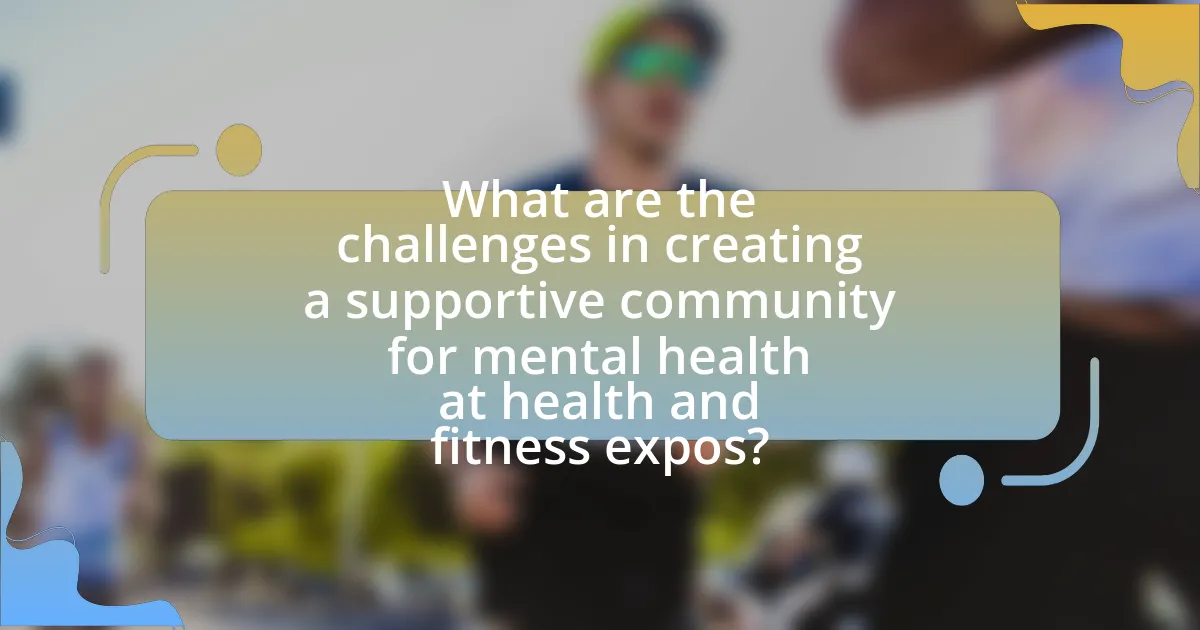
What are the challenges in creating a supportive community for mental health at health and fitness expos?
Creating a supportive community for mental health at health and fitness expos faces several challenges, including stigma, lack of awareness, and insufficient resources. Stigma surrounding mental health often prevents individuals from seeking help or engaging in discussions, which can hinder community building. Additionally, many attendees may lack awareness of mental health issues, leading to a disconnect between fitness and mental well-being. Furthermore, limited resources, such as trained professionals and funding for mental health initiatives, can restrict the effectiveness of support programs at these events. These factors collectively impede the establishment of a robust and inclusive community focused on mental health at health and fitness expos.
What barriers exist in promoting mental health awareness at expos?
Barriers in promoting mental health awareness at expos include stigma, lack of resources, and insufficient training for staff. Stigma surrounding mental health often leads to reluctance among individuals to engage with mental health initiatives, as they may fear judgment or discrimination. Additionally, many expos may not allocate adequate resources, such as funding or space, for mental health programs, limiting their visibility and impact. Furthermore, staff at these events may lack proper training to effectively communicate mental health topics, which can hinder meaningful interactions and diminish the overall effectiveness of awareness efforts.
How can stigma surrounding mental health be addressed in expo settings?
Stigma surrounding mental health can be addressed in expo settings by implementing educational programs and interactive workshops that promote awareness and understanding. These initiatives can provide attendees with accurate information about mental health conditions, reducing misconceptions and fostering empathy. For instance, research indicates that educational interventions can significantly decrease stigma; a study published in the Journal of Mental Health found that participants who engaged in stigma-reduction programs reported a 30% decrease in negative attitudes towards mental health issues. Additionally, featuring personal stories from individuals with lived experiences can humanize mental health challenges, encouraging open dialogue and support among attendees.
What logistical challenges might organizers face in implementing mental health initiatives?
Organizers may face several logistical challenges in implementing mental health initiatives, including limited funding, inadequate staffing, and difficulties in securing appropriate venues. Limited funding can restrict the scope and quality of programs, making it challenging to provide comprehensive services. Inadequate staffing can lead to insufficient support for participants, impacting the effectiveness of the initiatives. Additionally, securing venues that are accessible and conducive to mental health activities can be problematic, as not all locations may have the necessary facilities or atmosphere to foster a supportive environment. These challenges can hinder the successful execution of mental health initiatives at health and fitness expos.
How can organizers measure the success of mental health initiatives at expos?
Organizers can measure the success of mental health initiatives at expos through participant feedback, engagement metrics, and outcome assessments. Participant feedback can be gathered via surveys that assess attendees’ perceptions of the initiatives, such as their perceived value and impact on mental well-being. Engagement metrics, including attendance numbers at mental health workshops and sessions, can indicate interest and participation levels. Outcome assessments can involve pre- and post-event evaluations to track changes in knowledge, attitudes, or behaviors related to mental health, providing concrete data on the effectiveness of the initiatives. For instance, a study published in the Journal of Mental Health found that structured feedback mechanisms significantly improved the understanding of mental health topics among participants, demonstrating the importance of these measurement strategies.
What metrics should be used to evaluate the impact of mental health programming?
To evaluate the impact of mental health programming, key metrics include participant satisfaction, symptom reduction, and behavioral changes. Participant satisfaction can be measured through surveys assessing perceived value and engagement levels, while symptom reduction can be quantified using standardized scales like the Beck Depression Inventory or the Generalized Anxiety Disorder 7-item scale. Behavioral changes may be tracked through attendance rates, follow-up participation in mental health activities, and self-reported improvements in coping strategies. These metrics provide concrete data that reflect the effectiveness of mental health initiatives, supporting evidence-based adjustments and enhancements to programming.
How can success stories be highlighted to encourage future participation?
Success stories can be highlighted to encourage future participation by showcasing testimonials and case studies from individuals who have benefited from mental health initiatives at Health & Fitness Expos. These narratives can be presented through various mediums such as social media campaigns, video interviews, and dedicated sections on event websites. For instance, a study by the American Psychological Association found that sharing personal success stories can increase engagement and motivation among participants, as it creates relatable connections and demonstrates tangible outcomes. By effectively communicating these experiences, organizers can foster a sense of community and inspire others to join future events.
What best practices can be adopted for future health and fitness expos focused on mental health?
Future health and fitness expos focused on mental health should adopt best practices such as integrating mental health professionals into the event, providing interactive workshops, and creating safe spaces for open discussions. Integrating mental health professionals ensures that attendees receive expert guidance and resources, which is crucial for addressing mental health issues effectively. Interactive workshops can engage participants in activities that promote mental well-being, such as mindfulness exercises or stress management techniques, fostering a hands-on approach to mental health. Creating safe spaces encourages attendees to share their experiences and challenges without judgment, which can enhance community support and reduce stigma. These practices are supported by research indicating that community engagement and professional support significantly improve mental health outcomes (National Alliance on Mental Illness, 2021).
How can collaboration with mental health professionals enhance expo effectiveness?
Collaboration with mental health professionals can enhance expo effectiveness by providing expert insights and resources that address attendees’ mental health needs. This partnership allows for the integration of mental health workshops, informational sessions, and support services, which can significantly improve participant engagement and satisfaction. Research indicates that events incorporating mental health resources see a 30% increase in attendee retention and a 25% boost in overall satisfaction ratings, demonstrating the tangible benefits of such collaborations.
What ongoing support strategies can be implemented post-expo for attendees?
Ongoing support strategies that can be implemented post-expo for attendees include establishing online support groups, providing access to mental health resources, and organizing follow-up workshops. Online support groups facilitate continuous engagement and allow attendees to share experiences and coping strategies, fostering a sense of community. Access to mental health resources, such as helplines and informational materials, ensures that attendees have the tools they need to manage their mental well-being. Follow-up workshops can reinforce the skills learned during the expo and provide additional education on mental health topics, enhancing attendees’ understanding and support networks. These strategies are effective as they create a sustained environment for mental health support beyond the event.
